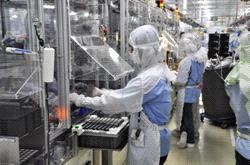Business News
Epson Batam Environmental Program Honored by Indonesian Government for Third Consecutive Year

Tuesday 19. February 2013 - PT. Epson Batam is located on Batam Island in Indonesia. The company is one of Epson's largest inkjet cartridge manufacturing plants and also undertakes mounting of semiconductors (ICs) and scanner manufacturing.
This article focuses on Epson Batam’s environmental activities, which have earned high praise from the Indonesian government for such achievements as energy-saving, the introduction of a waste-reduction type liquid waste treatment system for ink, and promoting non-cleanroom manufacturing throughout the company – while maintaining original quality. As a result of its efforts, Epson Batam has received government awards for three successive years.
Company-wide expansion of non-cleanroom manufacturing
Despite the diversity of Epson Batam’s operations, the company’s management insists that the company unites as one to promote environmental activities.
The 2010 fiscal year saw the realization of the non-cleanroom manufacture of scanners, which resulted in significant reductions in energy consumption. Moreover, the technology for controlling falling dust that was cultivated in those operations was subsequently deployed in inkjet cartridge manufacturing and IC mounting. In the scanner manufacturing operations alone, a significant reduction in costs was realized. This technology has been favorably received by the workers at the factory, who no longer have to wear dustproof clothing.
In addition to its improvements in manufacturing processes, Epson Batam is also promoting environmentally-conscious logistics. By reducing warehouse space, reducing air conditioning costs, and reusing product packaging materials in-house across all of its operations, the company has been able to generate even more reductions in energy and other costs. Measures that are conscious of the environment and costs are being carried out in every corner of the factory. Some of the smaller projects being promoted to cut energy costs include installing insulation in oven exhaust ducts and replacing the light bulbs in inspection equipment with LEDs.
Liquid waste treatment system for ink that is both environmentally and cost conscious
The ink blending process produces waste water when machinery is washed. Conventionally, treating this waste water involved the application of heat to separate the ink components from the water, but this type of treatment consumed a tremendous amount of energy. Moreover, running costs, such as the cost of electricity and the cost of sludge* disposal, as well as the cost of purchasing waste treatment equipment from outside sources were all very costly.
Due to the increase in the production of ink cartridges, Epson Batam worked jointly with the Plating Division of Singapore Epson Industrial Pte. Ltd., which possesses advanced technology in waste water treatment related to plating operations, to develop and adopt waste water treatment equipment that employed its own new method.
Because this new treatment technology uses electricity and chemicals to separate the ink components, the conventional treatment that employed heat was no longer necessary, making it possible to significantly reduce energy consumption. Furthermore, as a result of the dramatic increase in the level of separation, the quantity of sludge for disposal was reduced by 78% and running costs were reduced by 54% compared with their respective previous amounts. Among other benefits, the base price of the new equipment was half the price of conventional equipment, and its footprint was reduced by 58%, so it had a significant impact on both the environmental and cost.
* Solid waste that remains after treatment is carried out
New waste water treatment method
Social contributions
Tree-planting
Every year, with “Hijaukan Pantai, Hijaukan Bumi” (which means “the green seas, the green earth” in Indonesian) as its slogan, Epson Batam plants trees at locations such as schools, public facilities, the seashore, and local communities. The company, which planted a total of 1,295 trees from 2006 to 2012, planted 50 mango trees and released 12,000 catfish in communities in various regions this fiscal year.
Environmental education for elementary school students
Epson Batam believes in educating the future leaders of society about the environment and is committed to promoting its “Kids Go Green” program in local elementary schools. In fiscal 2012, approximately 70 students were invited to visit the company, where they joined programs that included mini-games with an environmental theme.
